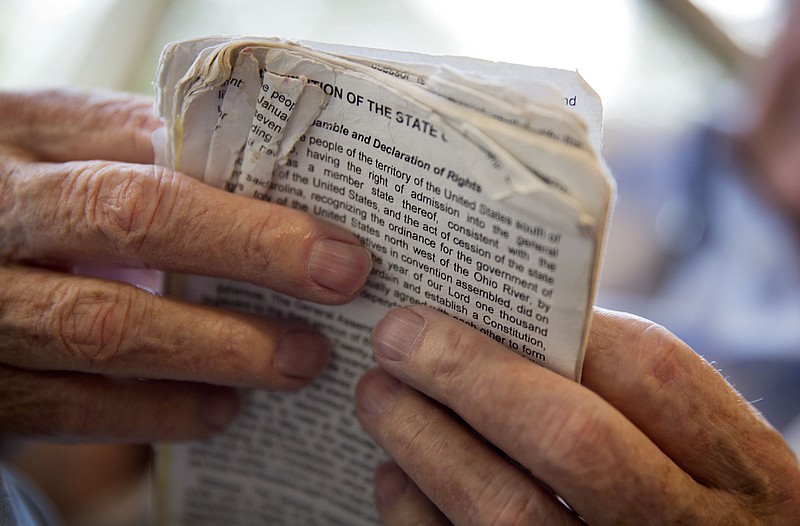Although the United States is becoming an increasingly secular country, authors used the words "God," "Supreme Being," "Supreme Ruler" or "Divine" in all 50 state constitutions.
What did they know that we don't know?
A Pew Research Center analysis says the 50 state constitutions use the aforementioned words for a higher power nearly 200 times in all, with three of the recently judged least religious states - Massachusetts, Vermont and New Hampshire - having some of the most references.
Massachusetts, tied for being the least religious state in a 2016 Barna analysis, has 12 references. John Adams, who later became the second president of the United States, was that constitution's principal 1779 author. Indeed, its structure served as a model for the U.S. Constitution, which was written eight years later.
Article II of its constitution is not vague about what the type of religious conviction its authors believed state residents should have.
"It is the right as well as the duty of all men in society, publicly and at stated seasons, to worship the Supreme Being, the great Creator and Preserver of the universe," it reads. "And no subject shall be hurt, molested, or restrained, in his person, liberty, or estate, for worshipping God in the manner and season most agreeable to the dictates of his own conscience."
What did John Adams know that we don't know?
North Carolina has the second most references to a higher power in its constitution - the third of which is in effect, with elements remaining from the first two - with 10.
But its preamble is clear on the reliance for the state's existence.
"We, the people of the State of North Carolina, grateful to Almighty God, the Sovereign Ruler of Nations, for the preservation of the American Union and the existence of our civil, political and religious liberties, and acknowledging our dependence upon Him for the continuance of those blessings to us and our posterity, do ... ordain and establish this Constitution," it reads.
What did North Carolina know that we don't know?
Even Vermont, which declared itself an independent country between 1777 and 1791, has nine references to a higher power in its state constitution.
In Article III of the document, written by Dr. Jonas Fay, a military and political leader, it assures state residents that "no person ought to, or of right can be compelled to attend any religious worship, or ... be justly deprived or abridged of any civil right as a citizen, on account of religious sentiments ... [but] every sect or denomination of Christians ought to observe the sabbath or Lord's day, and keep some sort of religious worship, which to them shall seem most agreeable to the revealed will of God."
What did Jonas Fay know that we don't know?
Tennessee, meanwhile, has four references to a higher power, with Georgia and Alabama having three each. Thomas Jefferson, who would go on to be the third president of the U.S., described Tennessee's founding document as the "least imperfect and most republican of the state constitutions."
Under Article I, Section 2 of Tennessee's constitution, it states "that all men have a natural and indefeasible right to worship Almighty God according to the dictates of their own conscience."
In the preamble of Georgia's founding document, it says "we the people of Georgia, relying on the protection and guidance of Almighty God do ordain and establish this Constitution."
Similarly, in the preamble of Alabama's constitution, it states "we the people of Alabama ... invoking the favor and guidance of Almighty God, do ordain and establish the following Constitution ..."
What did Tennessee, Georgia and Alabama constitution authors know that we don't know?
In keeping with the country's religious freedom founding, none of the state constitutions mandate a religion, but many delineate their citizens' right to worship or their right not to be compelled to worship. Several states ban those who do not believe in God from holding office but do not enforce such a rule as it violates the U.S. Constitution (which, ironically, never explicitly mentions God or the divine).
Among all references, according to the Barna analysis, the state constitutions have 116 mentions of "God," 46 of the "Almighty," 14 of a "Supreme" or "Sovereign Being," seven of the "Creator," seven of "Christian," four of "divine," three of "providence" and one of "Lord." A number of constitutions have the word "Lord" in the context of "the year of our Lord," but they are not included in the analysis.
What did these authors know that we don't know?
In this land where religious freedom was to be paramount, early settlers found abundant natural resources, an agreeable climate, plentiful fossil fuels and beautiful scenery, and cobbled those together with an independent spirit, a willingness to work hard and a love of God. Though their dealings with the original inhabitants of the country and the slaves imported here weren't right or fair, they nevertheless produced founding documents that grew a country that is the freest, fairest, wealthiest and most generous of any ever created. In turn, they wanted their states to reflect some of these God-given values.
We would do well to reflect on the wisdom of those state constitutions today.
